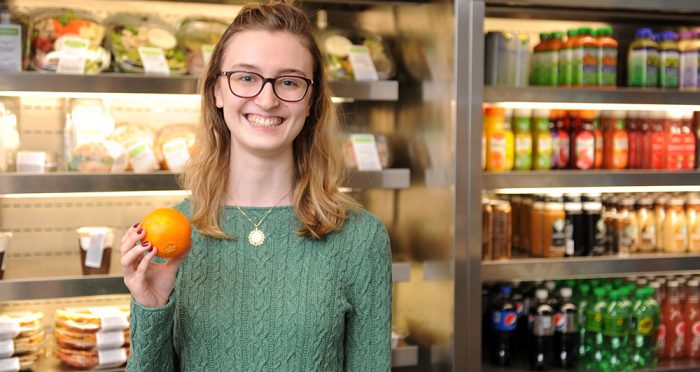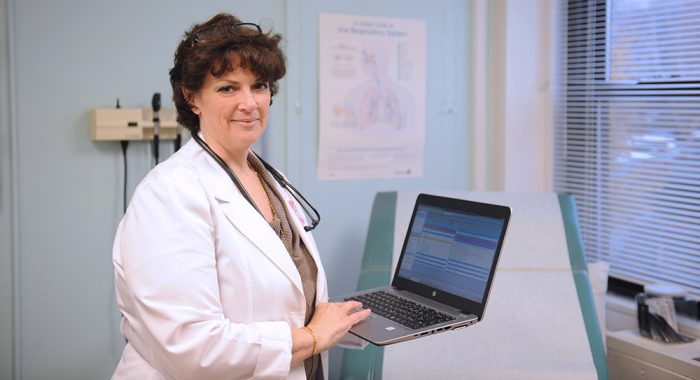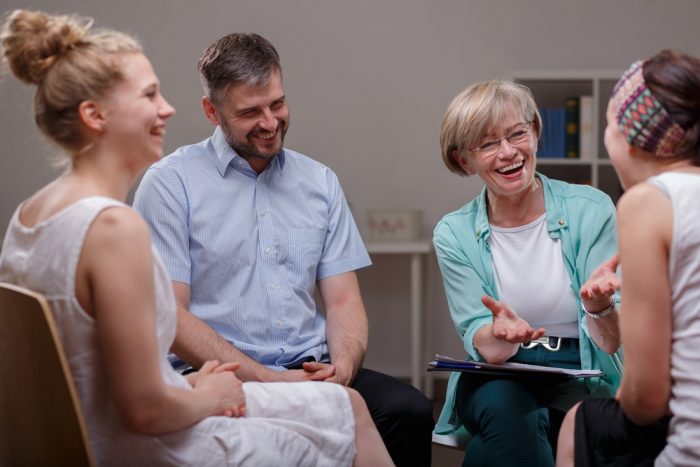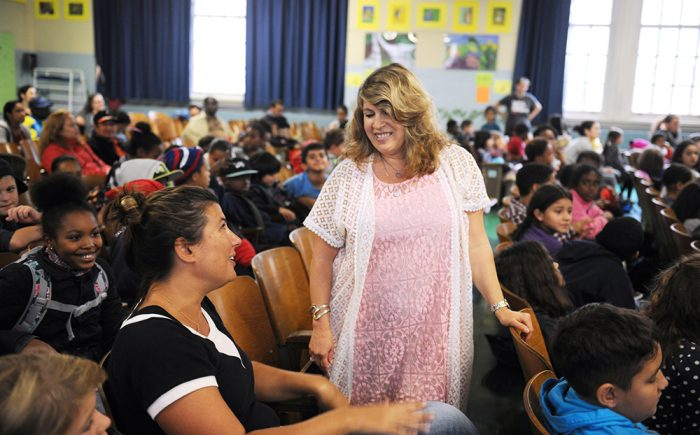Health is top priority at Adelphi, and students and the Division of Student Affairs are leading the way, with collaboration from faculty and the Center for Health Innovation.
Adelphi has long been a health leader, from the College of Nursing and Public Health, the oldest nursing program on Long Island, to the cutting-edge Center for Health Innovation founded just five years ago. Health on campus has long been a priority as well. The Student Affairs Health Services Center is especially proactive in supporting mental and physical well-being. Faculty, staff and students also regularly work together to promote a healthier Adelphi. But this year campus health is at the forefront like never before thanks to the Healthy Campus 2020 Initiative.
Healthy Campus 2020, a list of metrics laid out by the American College Health Association, outlines objectives for everything from reducing the number of students who say lack of sleep is harming their academic performance to increasing the number of students who report eating five fruits or vegetables a day. Mental health, violence prevention, fitness—the goals run the gamut, and Adelphi is pushing toward all of them in exciting new ways.

Adelphi University is taking a comprehensive approach to health in support of the national Healthy Campus 2020 initiative.
Students Take the Lead
In 2017, Adelphi’s Student Government Association (SGA) will roll out a new “Health Week.” Every weekday will have a theme: Healthy Meal Mondays, with $5 healthy-meal deals; Take Care Tuesdays, focused on self-care, with activities like meditation and painting for stress relief; Workout Wednesdays, with new campus fitness offerings; Trust Your Instinct Thursdays, focused on safety and preventing sexual assault; and Financial Fridays, with events related to financial health and career navigation. In every area, students are calling on the expertise of faculty and staff to round out their offerings.
The Health Week concept was developed by a Health and Wellness Council of the SGA and has generated a lot of enthusiasm already. “Everybody seems to be into it,” says SGA President Samantha Herskowitz ’18. “President Riordan, our deans and provosts…we have a lot of faculty support.”

Jacqueline Cartabuke, director of Health Services within the Division of Student Affairs, has worked with her team to convert the Health Center into a medical office that provides primary care to students.
Health, at Your Fingertips
Jacqueline Cartabuke, director of Health Services within the Division of Student Affairs, feels that same enthusiasm for the direction campus health is headed. “This is a wonderful time to be part of the campus culture and have the ability to be change agents,” she said.
When Cartabuke arrived at Adelphi in 2008, she converted the Health Center into a medical office that now provides primary care to the student body, and all along Health Services’ efforts have aligned with Healthy Campus 2020 goals, she said. But Adelphi’s reaffirmation of its commitment to Healthy Campus 2020 this year under Dr. Riordan’s leadership is making a significant difference.
“Bringing Healthy Campus 2020 to the forefront will assist all of the amazing offices on campus that already do so much and help to publicly display our work and collaborate to make our outreach even bigger to the campus community,” said Cartabuke.
One aspect of Healthy Campus 2020 in which Adelphi is already shining is Health IT. Through Adelphi’s Health Center and Health Portal on eCampus, students can see their medical records, schedule their appointments and send and receive secure messages with their health providers. That’s accessibility perfectly in line with Healthy Campus 2020’s goals.

The Division of Student Affairs supports student mental health through the many programs and services of the Student Counseling Center.
Helping Hands
Students, faculty and staff at Adelphi aren’t just working to make it easier for individuals to improve their own health. They’re working to create a community that helps one another and meets Healthy Campus 2020 goals along the way.
This past September, Carol Lucas Ph.D. ’13, director of Counseling and Support Services within the Division of Student Affairs, and Greta S. Tiberia, M.S.W. ’05, coordinator of Substance Abuse Counseling within the Division of Student Affairs, were awarded the Caron Foundation Educational Excellence Institution Award for Long Island for their efforts to support students who are coping with drug and alcohol addiction issues. As just one small part of this work, the Student Counseling Center offered an Opioid Overdose Prevention training in October, teaching attendees how to administer the reversal agent Narcan. Similar Opioid Overdose Prevention trainings are set to take place for nursing students this December and again in February.
Adding to the ways to help, the Student Counseling Center also offers a bystander training for suicide prevention throughout the spring and fall semesters, teaching attendees how to “question, persuade and refer” someone who might be suicidal.
Students are training for larger-scale emergencies too. In early November, undergraduates enrolled in Community Nursing (NUR 471) participated in a disaster simulation with Meghan McPherson, assistant director of Adelphi’s Center for Health Innovation and part-time faculty member in Adelphi’s Emergency Management program. Over the course of the evening, the 60 students played roles as triage rescue crews, victims, observers or evaluators in a train wreck, a bombing and a car crash on the Southern State Parkway, gaining experience they can call on in real-life emergencies.

Jessie Klein, Ph.D., associate professor, collaborates with the Center for Health Innovation on Creating Compassionate Communities, an outreach program aimed at eradicating bullying.
Reaching Past the Gates
While Healthy Campus 2020 limits itself to the health of students, faculty and staff, as a research university and a regional partner for health, Adelphi also clearly looks beyond its own community.
Faculty and students from the School of Nursing and Public Health, the School of Social Work and the Gordon F. Derner Institute of Advanced Psychological Studies are deeply engaged in healthcare issues in Suffolk and Nassau counties, but faculty from other schools are also joining the effort.
In early November, in partnership with Adelphi’s Center for Health Innovation, Deborah Little, J.D., Ph.D., associate professor of sociology, and Margaret Lally ’82, associate professor of theater, presented “Exploring Identity through Theater,” a course on exploring disability through theater and spoken word, to 75 guidance counselors, social workers and other local school personnel.
In early 2016, Associate Professor of Sociology and Criminal Justice Jessie Klein, Ph.D., in collaboration with the Center for Health Innovation, launched the Creating Compassionate Communities program, which provides empathy training and skill building for teachers, students and caregivers to help eradicate bullying. The program is now in four schools, and the Center for Health Innovation plans to take this program nationwide.
The Center for Health Innovation’s work stretches on from there, leading the discussion on autism, partnering with the Nassau and Suffolk County Offices of Emergency Management, and much more. But in the end, their work also comes back to students.
The Center for Health Innovation is currently developing The Health Innovations Living-Learning Community for students who have a personal or professional interest in or focus on health innovation.
Elizabeth Cohn, Ph.D., executive director of Adelphi’s Center for Health Innovation, recognizes a new charge on campus, galvanizing all this work. “Adelphi is very dynamic right now, and that makes it very exciting,” she said. “The energy is palpable in both students and faculty.”
For further information, please contact:
Todd Wilson
Strategic Communications Director
p – 516.237.8634
e – twilson@adelphi.edu